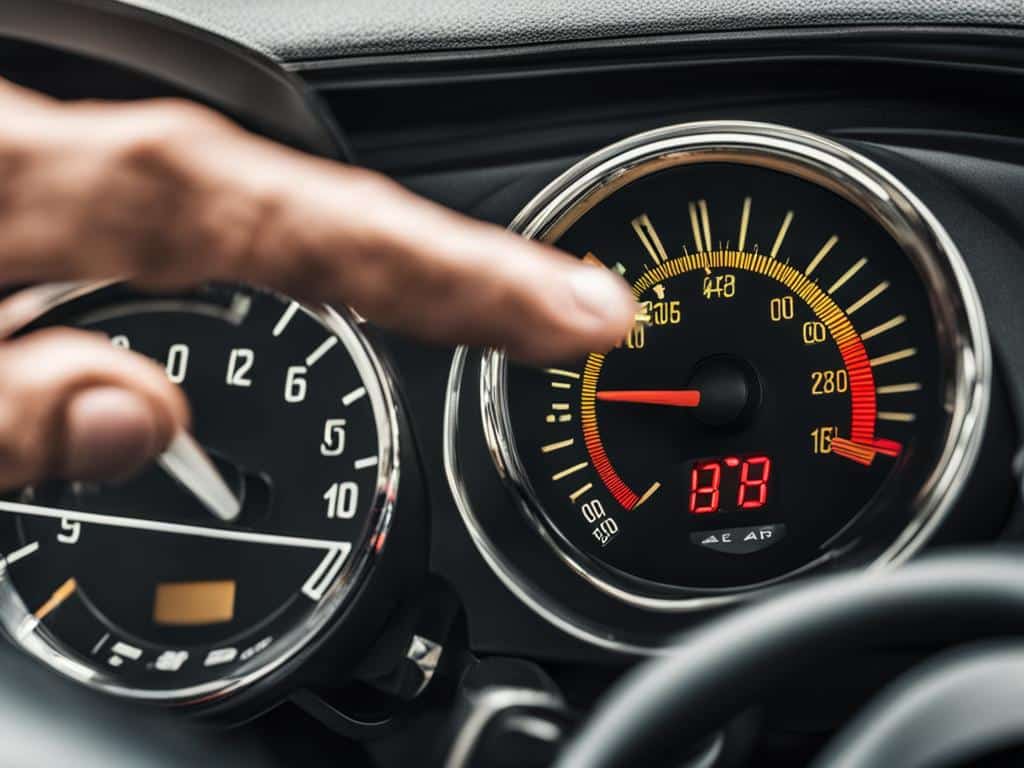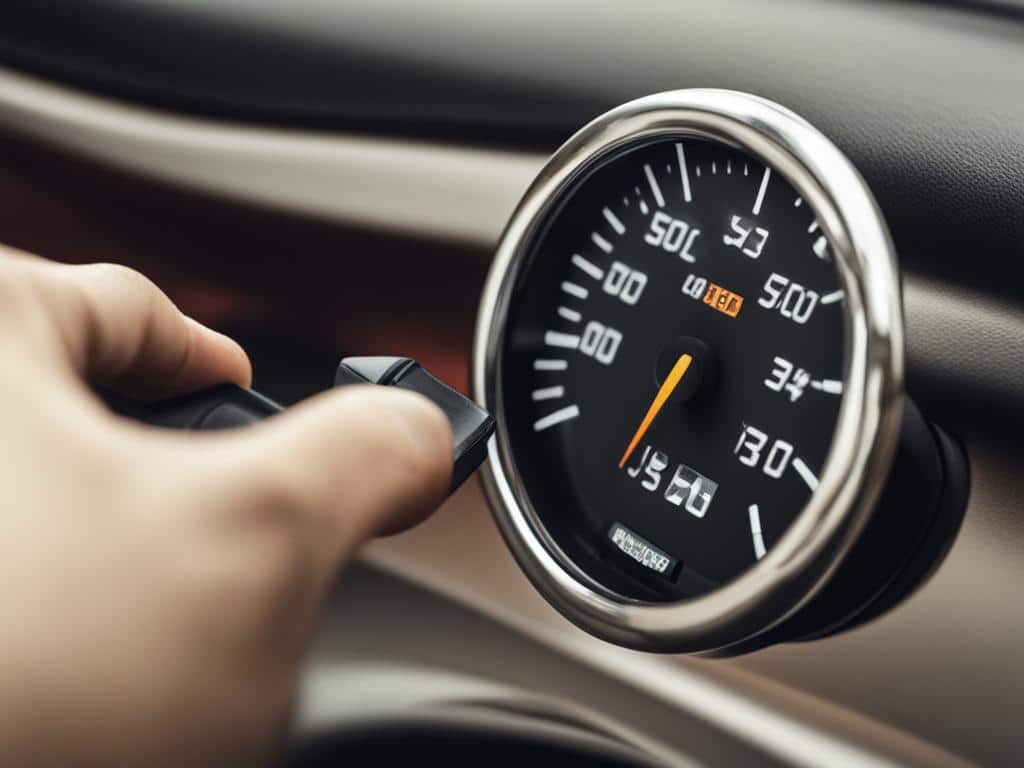When buying a used car in New Zealand, it’s important to consider the number of kilometers (kms) on the vehicle. But how many kms is too many? Let’s delve into the factors that determine the acceptable mileage on a used car in NZ.
Key Takeaways:
- Understanding the importance of mileage when determining a used car’s condition
- Factors affecting a used car’s value, including mileage
- Tips for buying a used car with high mileage
- No regulated mileage limit for used cars in New Zealand
- Obtaining a vehicle history report for insight into mileage and condition
Understanding the Importance of Mileage
When considering the purchase of a used car, one of the key factors to evaluate is the mileage on the vehicle. Mileage is an important indicator of a car’s condition and potential longevity. Higher mileage can suggest increased wear and tear, leading to a higher risk of mechanical issues and costly repairs. Therefore, it is crucial to understand what is considered high mileage and how it affects the overall value and reliability of the car.
In New Zealand, the average car mileage is around 14,000 kilometers per year. However, it is important to note that what is considered high mileage can vary depending on various factors such as the make, model, and age of the car. For example, a well-maintained luxury car may have higher mileage but still be in good condition, while a smaller economy car with the same mileage may have more signs of wear and tear.

When determining the condition of a used car, it is essential to consider not only the mileage but also other factors such as the car’s maintenance history, service records, and overall appearance. A well-maintained car with regular servicing and documented maintenance can still perform well even with higher mileage.
To gain a better understanding of the car’s past, obtaining a comprehensive vehicle history report can provide valuable insights into its mileage, previous owners, accident history, and maintenance records. This information can help assess the overall condition and reliability of the car.
Factors Affecting Used Car Value
When it comes to assessing the value of a used car, several factors come into play. While mileage is an important consideration, it is not the sole determinant of a car’s worth. Other factors such as the overall condition of the vehicle, its maintenance history, and the current market demand also impact its value. Let’s take a closer look at these factors:
- Condition: The physical and mechanical condition of the car plays a significant role in determining its value. A well-maintained car with minimal wear and tear is more likely to have a higher value compared to a vehicle in poor condition.
- Maintenance History: Buyers are often willing to pay more for a car that has a documented maintenance history. Regular servicing, timely repairs, and following the manufacturer’s recommended maintenance schedule can contribute to a higher resale value.
- Market Demand: The demand for a particular make and model can influence its value. If a certain car is in high demand and there are limited options available, the value may be higher. Conversely, if there is a surplus of similar vehicles on the market, the value may be lower.
It’s important to consider all of these factors when assessing the value of a used car. While mileage is a significant aspect, it should not be the sole focus. A car with higher mileage but excellent condition, a well-documented maintenance history, and strong market demand can still command a higher value compared to a low-mileage car with poor condition and maintenance.
Tips for Buying a Used Car with High Mileage
Buying a used car with high mileage can be a smart choice if you take the right precautions. Here are some tips to consider:
1. Thoroughly inspect the vehicle
Before finalizing your purchase, make sure to thoroughly inspect the car for any signs of wear and tear. Look for rust, dents, and check the condition of the tires. Additionally, it’s crucial to review the vehicle’s service history to ensure it has been well-maintained. Consider getting a pre-purchase inspection from a trusted mechanic to uncover any potential issues that may not be immediately apparent.
2. Research the specific model
Not all cars are created equal when it comes to high mileage. Some models have a reputation for being more reliable even with higher mileage. Take the time to research the make and model you are interested in, read reviews from other owners, and compare their experiences with similar cars. This can give you valuable insights into the specific car’s longevity and potential issues that may arise.
3. Consider the maintenance record
A well-maintained car can still perform well even with higher mileage. Ask for the maintenance records of the vehicle and check if it has received regular servicing and oil changes. A car with a consistent maintenance history is more likely to have fewer mechanical issues and can provide you with more peace of mind.
4. Negotiate the price
When buying a used car with high mileage, it’s important to use the mileage as leverage to negotiate a lower price. Higher mileage is often associated with higher depreciation, so take this into account when discussing the price with the seller. Be prepared to point out any potential repairs or maintenance that may be required due to the higher mileage.
By following these tips, you can navigate the process of buying a used car with high mileage more confidently. Remember to always do your due diligence, thoroughly inspect the vehicle, and consider the specific factors that impact the car’s reliability and value.
| Tips for Buying a Used Car with High Mileage |
|---|
|

Getting a Vehicle History Report
When it comes to purchasing a used car, obtaining a vehicle history report is an essential step in ensuring transparency and peace of mind. A vehicle history report provides valuable information about a car’s past, including its mileage and overall condition. By conducting a thorough vehicle history check, buyers can make informed decisions and avoid potential pitfalls.
There are several online services that offer comprehensive vehicle history reports for a fee. These reports compile data from various sources, including government records, insurance companies, and service centers. They provide details about the car’s previous owners, any reported accidents or damage, and the maintenance history. By reviewing this information, buyers can gain insight into the car’s mileage and condition, helping them assess its value and reliability.
Obtaining a vehicle history report is relatively simple. All you need is the vehicle identification number (VIN) of the car you are interested in. The VIN can typically be found on the car’s dashboard, driver-side door jamb, or vehicle registration documents. Once you have the VIN, you can visit a reputable online service provider, enter the VIN, and request a detailed report. It’s important to choose a reliable and trustworthy provider to ensure the accuracy and completeness of the information.
| Benefits of obtaining a vehicle history report |
|---|
| 1. Understand the car’s mileage: A vehicle history report can provide an accurate record of the car’s mileage over the years. This information allows buyers to determine if the car has excessive wear and tear due to high mileage. |
| 2. Identify potential issues: The report may reveal any reported accidents, flood damage, or major repairs that the car has undergone. This information can help buyers assess the car’s overall condition and potential risks. |
| 3. Ensure legal compliance: The report can verify if the car has a clean title and is free from any outstanding liens or legal issues. This ensures that buyers are not unknowingly purchasing a stolen or encumbered vehicle. |
By obtaining a vehicle history report, buyers can gain valuable insights into a used car’s mileage and condition. This information empowers them to make well-informed decisions and increases their confidence in the purchase. Whether buying from a dealership or a private seller, investing in a vehicle history report is a smart choice for any used car buyer.
Maintenance and Care for High-Mileage Cars
Proper maintenance and care are crucial for keeping a high-mileage car in good condition. Here are some tips to help you maintain and care for your used car with high mileage:
- Regular oil changes: Regularly changing the oil and oil filter is essential for keeping the engine running smoothly. Check your car’s owner’s manual for the recommended oil change interval.
- Scheduled maintenance: Follow the manufacturer’s recommended maintenance schedule for your car. This may include tasks such as replacing the air filter, spark plugs, and timing belt.
- Address issues promptly: If you notice any unusual sounds, vibrations, or warning lights, don’t ignore them. Have them inspected and repaired by a trusted mechanic to prevent further damage.
- Check and replace worn-out parts: Regularly inspect the brakes, tires, and other components for wear and tear. Replace any worn-out parts promptly to ensure your vehicle’s safety and performance.
Additionally, it’s important to keep up with regular maintenance tasks such as checking and topping up fluids (coolant, transmission fluid, etc.), cleaning or replacing dirty air filters, and maintaining proper tire pressure.
By following these maintenance practices, you can help prolong the life of your high-mileage car and minimize the risk of costly repairs down the line. Consulting a trusted mechanic for guidance and addressing any maintenance concerns promptly will ensure that your car remains reliable and in good condition.
Determining the Right Mileage for You
When it comes to buying a used car, determining the right mileage is a personal decision based on individual preferences, budget, and intended usage. While some may prioritize a lower mileage vehicle as a long-term investment with potentially fewer repairs, others may have budget constraints that make a higher mileage car a more practical choice. Ultimately, the right mileage for a used car depends on your unique circumstances.
When considering the right mileage for a used car, it’s important to evaluate the car’s condition and maintenance history. A car with lower mileage generally has less wear and tear, but it’s equally crucial to look beyond the mileage number. Consider factors such as the car’s overall condition, maintenance records, and any potential repairs or replacements that may be needed in the near future. A well-maintained car with higher mileage and a documented service history can still be a reliable option.
Researching the make and model of the used car you are interested in is also essential to determine the right mileage. Different makes and models have varying reliability and performance levels at different mileages. By reading reviews, owner experiences, and researching common issues associated with specific vehicles, you can gain valuable insights into what to expect in terms of reliability and potential mileage limitations. This information will help you make an informed decision and find the right balance between mileage and reliability for your needs.
Researching the Make and Model
When it comes to buying a used car, researching the specific make and model you are interested in is crucial. By taking the time to gather information and read reviews, you can make a more informed decision and avoid potential pitfalls. Here are some tips for researching the make and model of a used car:
1. Read Reviews
Start by searching for reviews of the make and model you are considering. Look for both professional reviews and customer feedback to get a well-rounded perspective. Pay attention to any recurring themes or issues that may arise in the reviews. This will give you an idea of common problems associated with the vehicle and allow you to determine if they are deal-breakers for you.
2. Consider Owner Experiences
In addition to reading reviews, it can be helpful to connect with current or previous owners of the make and model you are interested in. Online forums and social media groups dedicated to car enthusiasts are a great place to start. Ask questions about their experiences with the vehicle, such as reliability, maintenance costs, and any known issues. Hearing directly from owners can provide valuable insights and help you make an informed decision.
3. Check for Common Issues
Take some time to research any common issues or recalls associated with the make and model you are considering. Visit the manufacturer’s website and search for any official notices or technical service bulletins. This information will give you an understanding of any potential problems you may encounter and allow you to make an informed decision about whether the car is the right fit for you.
By thoroughly researching the make and model of a used car, you can gain valuable insights and make an informed decision. This knowledge will not only help you avoid potential issues but also ensure that you find a vehicle that meets your needs and expectations.
Conclusion
After exploring the factors that determine the acceptable mileage on a used car in NZ, it is clear that there are no strict mileage limits set by the country. Instead, buyers should consider the car’s condition, maintenance history, and intended usage when determining how many kms is too many.
While a car with lower mileage generally holds more value, it’s important to remember that other factors, such as overall condition and market demand, also play a role in determining a used car’s value. Thoroughly inspecting the vehicle, researching the specific make and model, and negotiating the price are all essential steps when buying a used car with high mileage.
Although New Zealand does not have regulated mileage standards for used cars, it’s crucial to be cautious and perform thorough inspections and research before making a purchase. Remember, the right mileage for a used car ultimately depends on your individual needs and priorities. So, take the time to evaluate all the factors and make an informed decision.
Conclusion
How do I determine the acceptable mileage on a used car in New Zealand?
The acceptable mileage on a used car in New Zealand depends on factors such as the make, model, and age of the car. It’s important to consider the car’s condition, maintenance history, and intended usage when evaluating mileage.
What is considered high mileage on a used car?
High mileage can vary depending on the make, model, and age of the car. In New Zealand, the average car mileage is around 14,000 kms per year, but what is considered high mileage can be subjective.
Should I be concerned about buying a used car with high mileage?
Buying a used car with high mileage can be a viable option if you take certain precautions. Thoroughly inspect the vehicle, research the specific model, consider the maintenance record, and negotiate the price to ensure a good purchase.
Are there mileage standards for used cars in New Zealand?
No, New Zealand does not have regulated mileage limits for used vehicles. However, buyers should be aware that higher mileage on a car can impact its reliability and longevity.
How can I gain insight into a used car’s mileage and overall condition?
Obtaining a vehicle history report can provide information about the car’s previous owners, maintenance records, and potential accidents or damage. Several online services offer comprehensive reports for a fee.
How do I maintain a high-mileage car?
Proper maintenance and care are essential for keeping a high-mileage car in good condition. Regular oil changes, scheduled maintenance, and addressing any issues promptly can help prolong the life of the vehicle.
What is the right mileage for a used car?
The “right” mileage for a used car depends on individual preferences, budget, and intended usage. It’s important to research the specific make and model you are interested in to understand its reliability and potential mileage limitations.
How can I research the make and model of a used car?
Look for reviews, owner experiences, and common issues associated with the specific make and model you are interested in. This research will give you a better understanding of what to expect in terms of reliability and potential mileage limitations.
When considering how many kms is too many on a used car in New Zealand, it’s essential to evaluate various factors such as the car’s condition, maintenance history, and intended usage. While there are no strict mileage standards in New Zealand, it’s advisable to be cautious when purchasing a high-mileage vehicle and perform thorough inspections and research before making a decision. Remember, the right mileage for a used car ultimately depends on your individual needs and priorities.




